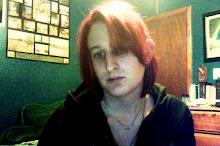Note: The following is a letter I wrote to the editor of F Word, a feminist magazine published at the University of Pennsylvania. Unfortunately the article to which I am responding is available at their website (www.pennfword.com).
Dear Anusha,
My name is Sonia Horan; we met (briefly) at the Penn campus as you were distributing copies of F Word. As I told you then, I’m generally very pleased to see a free feminist magazine available at a university campus—I wish my university had similarly made feminist ideas so readily accessible. However, as I also told you, I did take issue with Daniella Malekan’s analysis of Boys Don’t Cry. It’s ironic that in your own editor’s note you say, “Feminism isn’t an oppressive sight, sound, or symbol,” yet Malekan’s essay (regardless of her intentions) is, indeed, oppressive. Granted, I don’t want to presume that Malekan set out to erase Brandon’s identity, and I hope she did not intended to focus on sexuality at the exclusion of gender identity; nonetheless, her piece is highly problematic insofar as it undermines Brandon’s gender identity and, in so doing, also undermines the very point Malekan is trying to get across, namely that normative restrictions on identity marginalize queer identities and often produce violent (and at least produce oppressive) responses to “non-normative” identities.
In the GLAAD media resource guide (http://www.glaad.org/Page.aspx?pid=376) and the AP Stylebook, New York Time and Washington Post media reference guides (http://www.glaad.org/Page.aspx?pid=380) there are clearly outlined rules for discussing transgender people. In particular, they include a review of problematic and defamatory language and directions for pronoun and name usages. Throughout her essay, Malekan uses female pronouns (she/her) for Brandon despite Brandon’s clear identification as male/masculine. Indeed, Malekan also refers to Brandon not by his chosen name, but as “Teena/Brandon.” Let me be frank: Malekan’s piece did not respect Brandon’s preferred name or his preferred pronouns and therefore did not respect his identity. At best, the way in which Brandon’s gender was treated in this essay was highly inappropriate, and overall none of Malekan’s references to Brandon were in keeping with any of the above-mentioned style guides. As an author in a feminist magazine I would hope Malekan would be aware of these issues, and as an editor I hoped you would require submitted works to adhere to the guidelines of the GLAAD media resource guide—or at the very least the AP Stylebook.
Beyond merely being insensitive to Brandon’s identity, however, Malekan’s analysis of Boys Don’t Cry also has a most curious usage of Eve Kosofsky Sedgwick’s work. It is painfully ironic that Sedgwick’s Epistemology of the Closet is used in an essay that, in effect, forces Brandon back into the closet. Malekan doesn’t seem to understand the factors surrounding Brandon’s rape and murder; she focuses entirely on Brandon’s sexuality without examining Brandon’s gender identity, and she doesn’t seem to acknowledge that a major factor in his murder was transphobia. In ignoring these critical details, Malekan misses the significance of Brandon’s murder—and further misses the point of Boys Don’t Cry. Indeed, Malekan’s essay takes a transsexual narrative, strips it of transgender substance, and repackages it purely as a gay narrative. She has reconstructed the transgender closet and forced any discourse of transphobia and transsexuality back inside, out of sight and out of mind.
To be frank once more: Malekan’s essay oozes cissexualism. Speaking as a transsexual, reading Malekan’s essay was particularly painful for me. It hurts, and it is offensive to see Brandon and other transgender victims of hate crimes co-opted into gay narratives at the expense of their identities. I really don’t think Malekan intended to offend, and I don’t think you intended to publish any oppressive literature—and I certainly don’t think either of you meant to silence trans voices. I’m hoping that this email does not put you or Daniella Malekan in a defensive position; if anything, I hope this correspondence has been able to raise awareness of implicit cissexualism/cisgenderism present in this particular essay and I hope that you and the voices represented in F Word will accurately and respectfully represent transgender identities in the future.
Thank you very much for your time. I hope to someday revisit the Penn campus, and when I do I will be interested to see how F Word has evolved.
Best wishes,
Sonia Horan
Subscribe to:
Post Comments (Atom)

Perfectly reasoned reply, lets hope they have the intelligence and understanding to take it on board.
ReplyDeleteCaroline xxx